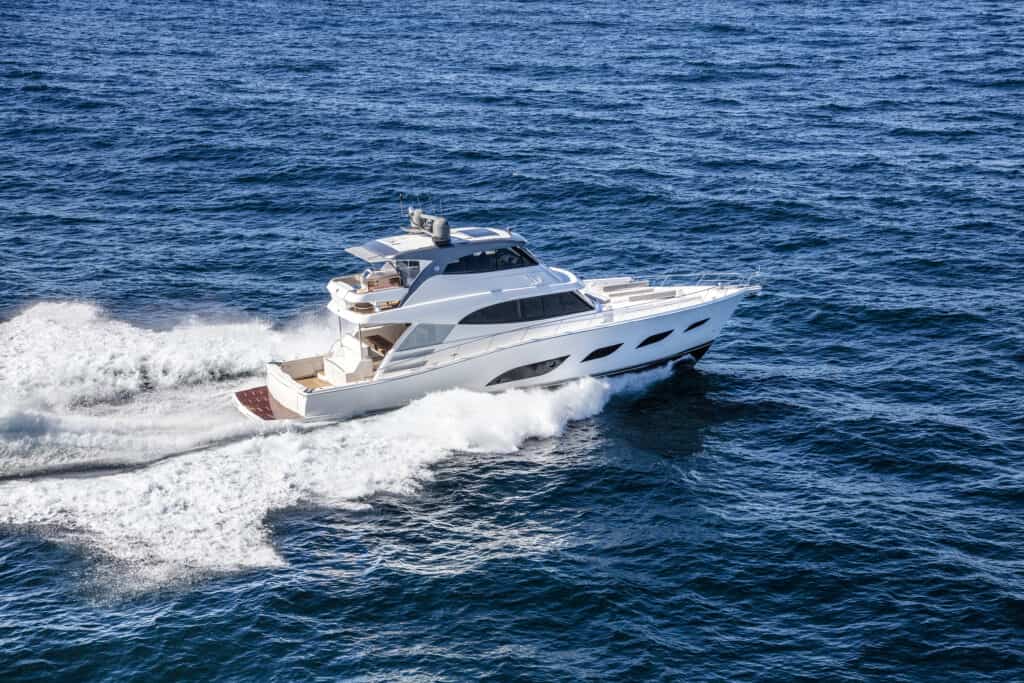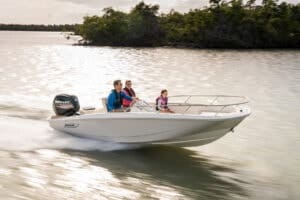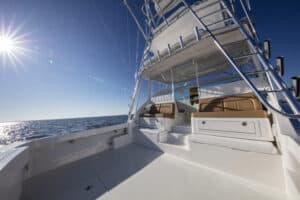For many people, buying a boat is a hard-earned financial achievement. After all, a five- or six-figure price tag on a boat isn’t uncommon, with many boats even crossing over into the seven-figure range (or higher). The reality is, however, that the actual sticker price of your boat is just the first in a long line of boat-related costs. Boat ownership involves many auxiliary expenses, all of which should be considered before you ever even start shopping around for your next watercraft. If you’re ready to become a boat owner, learn how we do boat loans at Trident Funding.
Whether you’re in the market for a skiff, ski boat, or mega yacht, here’s everything you need to know about the true cost of boat ownership.
The Cost of Boat Ownership
1. Buying a Boat
2. Boat Taxes and Fees
3. Insuring Your Boat
4. Registering Your Boat
5. Boat Safety Expenses
6. Servicing and Repairing Your Boat
7. Storing Your Boat
8. Upgrading Your Boat
9. Operating Your Boat
The average cost of owning a boat
When it comes to figuring out how much your new boat will cost you each year (and how to budget for that new expense), there are many different individual costs you’ll want to consider.
1. Buying a boat
It may be obvious, but the very first boat expense you’ll probably encounter is the initial purchase price, or what it costs to buy your boat in the first place.
How much this sets you back depends on the make and model of the boat you choose as well as its model year, length, and condition. Even your location can play a role in the purchase price, as can the time of year.
There’s a very wide range of boat prices, too. According to NADA, a 2022 Godfrey Aqua Patio pontoon boat (22 feet) has an MSRP of $80,113. That same model year, you could buy a 19-foot Stingray power boat for about $38,500. Start looking into ski boats, house boats, or yachts, and you can easily spend six figures or more. Many online boat shoppers peruse Boat Trader or YachtWorld to find boats they want to buy.
2. Taxes and fees
If you buy your boat outright with cash, you won’t have any additional purchase costs. However, if you finance your purchase with a boat loan, you may pay loan origination fees as well as finance charges over the course of the loan. These will increase your overall total cost.
Additionally, you will pay taxes on your boat based on your municipality. This may include sales tax at the time of purchase as well as personal property tax on a recurring basis. Be sure to check the regulations in your area to know what’s owed.
3. Insuring your boat
Insurance is a necessary product to have for all of your valuable assets, including your home, cars, and yes, your boat. As with auto insurance, boat coverage protects your boat against any number of perils that could result in damage, theft, or loss.
This gives you a safety net in case your boat is affected by lightning, gets vandalized, or is stolen right out of your slip. It also provides financial protection for others in case your boat were to cause damages or injuries to anyone else. This liability coverage is mandatory in most states.
In addition to this coverage for everyday perils, you might also consider buying additional boat insurance. These optional policies and coverage add-ons offer things like:
- Towing services, if your boat were to be disabled
- Coverage for your trailer
- Protection during named storms, such as hurricanes
You can buy boat insurance coverage from many of the same providers that offer auto insurance policies, and you may even be able to bundle your coverages together to save money. There are also marine boat insurance carriers that specialize exclusively in boat insurance.
Your premiums depend on factors like:
- Your boat’s value
- What type of boat it is
- How the boat will be used
- Where the boat is stored
- Who will be operating the boat
- Your location
- The deductible you choose
- How much coverage you want to buy
- Any discounts you may qualify for
The more coverage you add, the more you can expect to pay in premiums. According to Progressive, annual boat insurance premiums averaged between $263 and $527 between 2021-22.
4. Registering your boat
In most states, you’ll be required to register any motorized watercraft you own. This includes jetskis, fishing boats, and even sailboats with motors. You may be able to skip registering non-motorized boats, such as kayaks and canoes, but this really depends on your location. It’s important to check you state’s guidelines!
Registering your boat is very similar to registering your car, and involves submitting an application, paying a fee, and providing the state with certain documentation. Fees are usually dependent on the boat’s size, and registration will need to be renewed on an annual basis
Supporting documents for a registration application may include your name, address, and driver’s license number along with the boat’s VIN, make/model, and year. You will need to provide the boat’s title or your lienholder information (if you have a boat loan). Once you’ve completed the application process and been approved, you’ll receive registration stickers from the state that will need to be displayed on your watercraft.
5. Boat safety expenses
There are certain things you’ll need to have on board your boat to ensure that it is both legal and safe. Some of these items will need to be replaced on a regular basis, too.
Boat safety equipment and expenses may include:
- Appropriate life jackets and flotation devices for all passengers
- Fire extinguisher
- First aid kit
- Safety beacons or rescue flares
- Running lights
- Signal flags
- Towing rope
- Anchor
- Bumpers
While this isn’t likely to be your boat’s priciest line item, these expenses warrant noting all the same.
6. Servicing and repairing your boat
If there’s one thing that boat owners understand, it’s that there’s no shortage of repair and/or service costs over the course of your boat ownership.
Whether we are talking about washing your boat, removing barnacles, replacing batteries, or servicing a damaged prop, your boat will encounter added costs over time. The larger your boat, the more use it gets, or the more sophisticated its systems, the more frequent and costly these expenses can be.
Keeping up with regular maintenance can help keep your boat running well for many years to come, and save you from some bigger repair expenses. But maintaining a boat doesn’t come cheap, either.
You may pay a few hundred dollars to winterize and haul-out your boat (assuming you don’t use it year-round), plus another few hundred in the spring for make-reading and launching. You can also expect to pay to change your engine oil, service the air conditioner, freshen up a paint job, wax the exterior, repair upholstery, and more.
7. Storing your boat
The size of your boat, its location, and how you use that boat all play into how you will need to store it. Smaller boats in urban locations may be trailered in as needed, whereas larger watercraft may need to stay in the water most of the year.
Mooring charges, slip fees, or boat yard storage costs can all add up. Your expenses will also vary depending on whether you keep your boat in a municipal slip versus a private yacht club.
As the seasons change, you may want (or need) to have your boat stored for the winter. Seasonal storage fees might include haul-out, winterization of your boat, shrink wrapping, line clearing, and on-site storage, if you don’t opt to store the boat on a trailer yourself.
8. Upgrading your boat
Over time, certain components on your boat will begin to break down and will need to be replaced or upgraded. As new features are made available and the systems in your boat age, you may even want to replace systems that haven’t yet reached failure. Whether your upgrades are a matter of preference or priority, the cost can really add up.
Most often, boat owners can expect to eventually replace or upgrade their boats:
- A/C system
- Decking
- Seats/upholstery
- Engine
- Electrical lines and battery
- Lighting
The timing of these upgrades depends not only on your boat and its age, but also your own personal preferences. Some of these upgrades may be a want while others will eventually be a need.
9. Operating your boat
Now that you know how much it’ll cost just to own your boat — even if it never leaves the marina — you need to budget for its operating costs. You know, for when you actually want to go out and enjoy the watercraft.
One of the biggest operating costs for a boat is gasoline. If your boat is small enough to be trailered, you can fill up at a gas station on your way to the boat launch. This can save you money and allow you to find the lowest prices on your route.
If your boat is kept on the water or is too big to be trailered, you’ll need to purchase gas on the water. Boat gas can be purchased at marinas and boat docks. This gasoline is generally more expensive per gallon than the same gas at a conventional gas station.
You’ll also need to consider your boat’s recommended octane rating (whether you can buy regular gas or if you need supreme or premium) and its fuel efficiency. Both will affect how much it costs you to fill up and how long that tank of gas lasts. Lastly, how you drive your boat matters: a slow cruise around the bay will burn less fuel than if you’re racing across the lake.
A high-performance speed boat towing skiers can easily burn through 100 gallons of fuel (or more) in an afternoon. At $5.00 per gallon, you’re looking at $500 in gas costs alone.
Add in the cost of driving to the water, trailering your boat back and forth (if applicable), and driving home, and you can see how a weekend on the boat warrants some budgeting.
The Cost of Owning a Boat: The bottom line on boat expenses
While paying for your watercraft might be the biggest single expense you budget for, the cost of owning a boat actually involves many future and recurring expenses. Understanding this can not only help you budget accordingly, but can even make it easier for you to shop around and save money.
Already have a good idea of what your boat will cost you over the years? Then your next step is to apply for a boat loan and start shopping for the perfect boat.






